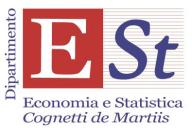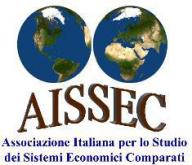14 | DECEMBER 2019
by Xieshu Wang and Marta Marson, University of Turin and OEET
Newsletter n. 14| December 2019 - Download PDF
Like the previous one this issue of Emerging Economies includes contributions presented at the 5th Workshop organized by OEET and AISSEC at the Department of Economics and Statistics “Cognetti de Martiis” of the University of Turin on 3rd and 4th of October 2019, around the topic of “Trade Wars and Global Crises: The Outlook for Emerging and Advanced Countries”.
By M. Blanga-Gubbay[1] Université Libre de Bruxelles (ECARES) and University of Zurich (Kühne Center) and M. Hennicke Université Libre de Bruxelles (ECARES) and Université de Cergy-Pontoise
Recent trade agreements have moved beyond tariff reductions, encompassing provisions and obligations related to non-tariff issues. These aspects are often seen as the reflection of interest groups, able to manipulate and extract additional rents from the ratification of these agreements. We provide empirical evidence that corporate lobbying on trade agreements matters for corporate profits. We use the historical shock to U.S. trade policy – the non-ratification of the Trans-Pacific Partnership (TPP) – following the unexpected victory of Donald Trump in the 2016 U.S. presidential election. We find that stock prices of companies that lobbied in favour of the TPP underperformed following the election. On the intensive margin, we find a strong and positive relationship between the amount spent in lobbying and the cumulative losses of lobbying firms. Finally, by comparing the original TPP agreement with its newer version (CPTPP) without U.S. participation, we provide evidence that firms’ lobbying activity was related to having some specific provisions included in the agreement.
By Annamaria Mazzoni, Ph.D. Candidate of the University of Turin
This contribution briefly analyses the economic and environmental impacts of the blockade imposed on Qatar in June 2017 and contributes to the debate on the effectiveness of economic sanctions as an instrument for foreign policy. In particular, the study highlights how the negative impacts on Qatar’s trade flows were concentrated mainly in the first months after the blockade (short-term), while already towards the end of 2017 new trade routes were opened and new trade relations developed. On the contrary, if we look at the “environmental” implications of the blockade, the numerous programs for increasing the local food production improving the national food security, decreasing the dependence from foreign imports to achieve higher self-sufficiency are potentially detrimental for the water resources of the country. In fact, while this can be seen as a strategic solution if the current situation will become the new status quo for the region, the scarcity of natural resources (land and water), represents a major constraint for the development of an efficient and sustainable agricultural system in the near future. Therefore, in order to study the feasibility of this autarkic response, I also explore the environmental effects of the blockade on the country’s natural resources.
By Luigi Benfratello, Anna D'Ambrosio, and Alida Sangrigoli, Politecnico di Torino, Italy
Chinese outward investments have dramatically increased in the last decades. Since the introduction of Deng Xiaoping's “Go Global Policy” in 1999, Chinese outward FDI stock grew by almost 70 times. The announcement of the creation of a new Silk Road, in 2013, referred to as the Belt and Road Initiative (BRI), showed clearly the will of the new Xi Jinping administration to make Chinese foreign investment policy more audacious and to become one of the largest FDI recipients and investors among the pool of the major global economic players.
Our activities
-
AFRICA: DEVELOPMENT, SUSTAINABILITY AND GREEN TRANSITION
Tuesday, January 27th 9.45 – 17.00 Aula SV002, Università Cattolica del Sacro Cuore; Via San...









